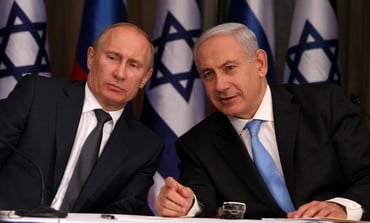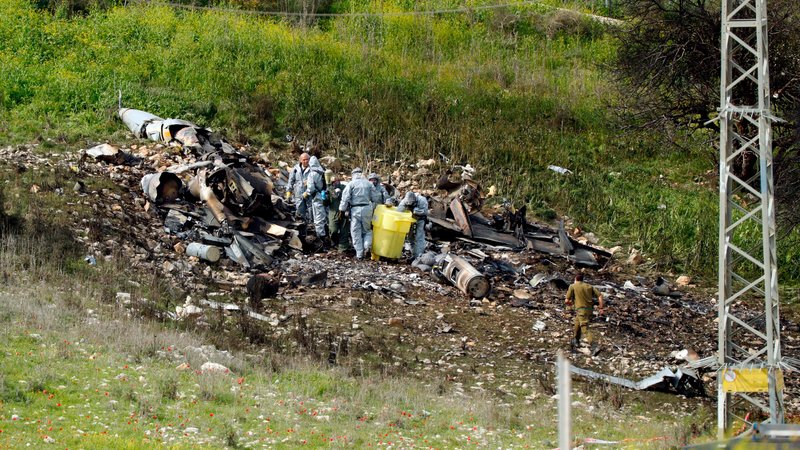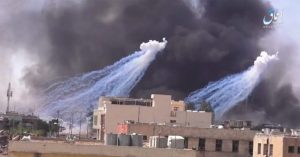Dangerous Delusions: Syria Isn’t Going to Liberate Palestine Anytime Soon nor Is Russia Turning Against “Israel”

A wave of hysteria has swept the Alt-Media Community following Syria’s downing of an “Israeli” jet, but for as much as people want to imagine that Damascus is on the cusp of liberating Palestine and that Moscow has turned against Tel Aviv, believing anything of the sort is nothing more than wishful thinking.
Pop The Champagne!
Syria finally shot down an “Israeli” jet after what some sources have estimated was the Zionist entity’s more than 100th strike against the Arab Republic since 2011, and Damascus’ supporters all across the world are celebrating this powerful act of Resistance for putting Tel Aviv in its place.
This event was made all the more symbolic because Syria has been struggling against 7 years of multifaceted Hybrid War, showing the world that even the most conflict-weary state in the Mideast is capable of successfully standing up to the regional bully.
The resultant euphoria has begun to take on hysterical dimensions, however, with many Alt-Media commentators suggesting that Russia has taken Syria’s side in this conflict and that this automatically means that Damascus and its allies are on the cusp of liberating Palestine.
Nothing of the sort has happened and any “serious” talk about these long-awaited developments is delusional.
Sobering Up
Russia’s position has been deliberately ambiguous and corresponds with its new diplomatic-strategic position of attempting to achieve a “balance” between opposing parties in any given conflict.
Much ado has been made about President Putin’s plea to Netanyahu to avoid any escalation of the War on Syria, but this was to have been expected, just as it was predictable that people would see in this statement whatever they wanted to.
Instead of soberly recognizing that this is Russia’s standard response to any development that happens anywhere in the world, some people wrongly interpreted this as Putin chastising Netanyahu, with this narrative being reinforced because details about the presumed talks that he must have also had with his Syrian and Iranian counterparts haven’t been disclosed.
For reasons of strategic sensitivity in the framework of the Astana peace process, Russia is likely to refrain from any public criticism of Syria and Iran, and it’s very telling that the Russian Ministry of Foreign Affairs (MID) and the country’s Presidential Administration haven’t commented on the veracity of “Israel’s” claims that an Iranian drone flying over the occupied Golan Heights was what sparked the latest escalation.
The absence of commentary doesn’t indicate that Russia is dismissing “Israel’s” narrative, but to the contrary suggests that it is quietly accepting it as truth, though as was remarked above, is reluctant to say anything further about these claims in public because of its relationship to Syria and Iran in this sensitive context.
The Imaginary Russian-“Israeli” Split
Like the author wrote about last year, “Does Anyone Still Seriously Think That Russia And Israel Aren’t Allies?”, and any shocked readers should reference that piece for more background information into this admittedly provocative pronouncement if they aren’t already aware of how close these two sides really are.
Russia may feel uncomfortable about what “Israel” has just done in Syria, but it’s been passively facilitating such strikes for the past 2-5 years in an attempt to “balance” regional affairs per the “19th-Century Great Power Chessboard” paradigm, particularly as it relates to limiting Iran’s post-Daesh role in Syria.
Moscow’s silence every other time that this happened points to at least tacit approval of Tel Aviv’s actions or even clandestine coordination at times, because as the saying goes, “words are cheap”, and while it couldn’t have hurt Russia’s soft power to at least rhetorically condemn all of “Israel’s” previous bombings, Moscow still abstained from doing so.
The remains of the F-16 jet that crashed in northern Israel (Source: RTE)
What Russia didn’t expect, however, was that Syria would ever succeed in shooting down an “Israeli” jet, as it’s for Moscow’s aversion to this very same scenario that it has hitherto held off on selling top-notch anti-air missile systems to Damascus and has clearly reaffirmed on multiple occasions that its in-country military mandate does not include protecting Syria’s airspace from any foreign air force, whether American, “Israeli”, or Turkish.
This implies that Russia did not in fact provide Syria with the directive to shoot down the “Israeli” jet, nor would it have ever approved of such an action if it was previously informed, thus debunking the “populist” claims that Moscow gave the green light to Damascus to carry out this prominent act of self-defense.
Syrian Sovereignty And Its Limitations
Russia was probably informed of what happened immediately afterwards, but Syria as a sovereign state wouldn’t have sought its approval beforehand in any case, nor should it have.
Seeing as how this action prompted “Israel” to pummel Syria’s air defenses in response — an objective fact that’s “coincidentally” forgotten amidst the Alt-Media celebrations — it’s indeed true that the conflict between both parties has escalated, though that doesn’t mean that Syria’s response was unjustified or that Damascus is about to commence a liberation campaign in Palestine.
To address the first of the two, Syria has every right to defend its airspace from foreign intrusion no matter what the reason is for the external force’s territorial infringement (e.g. an Iranian drone venturing into the occupied Golan Heights), even if this sovereign decision “endangers” Russia’s “master plan” of “balancing” the Mideast.
As for the second point, there is no way that the Syrian Arab Army (SAA) is anywhere capable of freeing Palestine owing to “Israel’s” track record of responding with overwhelming force in the face of even the tiniest move in this direction, as was just evidenced by its large-scale bombing run against the country’s air defense systems after losing one of its jets.
“Allied” Disagreements
Having established the realistic limitations to what Syria can do against “Israel”, as well as explaining the nuances of Russia’s position in this matter, it’s now time to tackle the origin of this latest escalation and explain why it happened in the first place.
The Syrian state and its people were saved from impending destruction following Russia’s decisive anti-terrorist intervention in 2015, and while forever indebted to Moscow for what it did, Damascus doesn’t automatically have to comply with all of its partner’s “suggestions” for “politically” resolving the country’s conflict.
To be direct, Syria does not have to approve of the “decentralization” clauses controversially included in the 2017 Russian-written “draft constitution” for Syria out of the implied “guilt” that it “owes” Moscow something for saving it, considering that Russia’s mandate is specifically to fight terrorism and does not entitle it to lead the subsequent “peace process”.
That said, as the UNSC country with the most powerful influence over Damascus, it’s natural that Russia would take the lead in trying to kickstart the country’s stalled commitment to Resolution 2254’s mandate that it carry out “constitutional reform” and hold new elections, and this ambitious role is intended to deepen Moscow’s multipolar leadership in the Mideast following the vacuum that was created in the wake of Washington’s “Pivot to Asia”.
No matter the well-intended win-win motivations behind Russia’s stewardship of Syrian peace process, the “inconvenient fact” remains that the country’s government has been dragging its heels in this regard out of its implied unhappiness with Moscow’s “suggestions” and its unwillingness to commit to a “military solution” that would fulfill President Assad’s famous promise to liberate “every square inch” of Syria.
So as not to be misconstrued at this delicate moment of the analysis, the author is not hinting that there is a serious rift between the two wartime partners, but just that there nevertheless exist differences of vision — particularly over the end game — that are perfectly normal for any pair of friendly countries to have.
The Deir ez-Zor Disaster
The point to remember, however, is that Russia doesn’t have a “monopoly” on the Syrian peace process and that Iran is also crucially involved as well, and unlike Moscow, Tehran is in perfect alignment with Damascus’ preferred path forward in the war, no matter how unachievable it might be given the presence of approximately 2000 US troops and 10 American bases occupying the energy-rich and agriculturally wealthy northeastern third of the country.
Russia realized the impossibility of forcing the US out of Syria early on and that’s why it entered into a “gentlemen’s agreement” with it to informally recognize a so-called “deconfliction line” between these two Great Powers along the Euphrates River, but Syria and its Iranian ally don’t accept this deal and are intent on opposing it to the best of their abilities, just as they don’t like how Russia has passively allowed “Israel” to carve out a “buffer zone” near the occupied Golan Heights via its “rebel” proxies.
To this end, the SAA and their supported militias (which might have possibly included some kind of Iranian element as well) responded to Kurdish-led SDF provocations along the Russian-US “deconfliction zone” near Deir ez-Zor but were then decimated when the US promptly carried out a punitive strike against them, one which led to Russian condemnation but nothing else, whether before or after.
It’s possible that Syria was encouraged by Iran to respond to the Kurdish attacks despite what might have been Russia’s general orders to stand down under any such conditions while Moscow attempts to enter into a “deal-making” dialogue with Washington, and it’s Damascus’ refusal to follow this “protocol” that could have triggered the US to react with disproportionate force in seeking to “set an example”.
This version of events would also explain Russia’s lack of any substantial response before or after what happened.
Gambling In The Occupied Golan Heights
Should that have been the case, then Syria clearly didn’t heed the US’ “warning” because it soon thereafter might have been encouraged by Iran once more to defend itself from America’s “Israeli” ally in the southern part of the country against what could have either been yet another unprovoked attack (albeit one which Russia seems to always quietly agree with “Israel” is due to some sort of Iranian ‘tripwire’) or a drone ruse by Tehran in order to catalyze events.
It should be explained here that Iran, as a military actor invited into Syria at the request of the democratically elected and legitimate government, has every legal right to operate drones inside the country’s internationally recognized territory which thus includes the “Israeli”-occupied Golan Heights, so there’s no reason in principle to deny that it flew a drone over that part of the state if that’s what truly happened (and which Russia hasn’t openly denied).
Nevertheless, international law and international reality are two different things, and the facts on the ground are such that “Israel” has unilaterally and illegally annexed the Golan Heights, so flying an Iranian drone over them would indeed incite a military response no matter how illegal it may be.
Iran might have wanted to set a trap for its hated Zionist enemy, especially if it had just secretly improved Syria’s air defense capabilities, and this might have been something that Syria would have voluntarily gone alone with in earnest owing to the identical policy that it shares with Tehran when it comes to “Israel”.
The “Resistance’s” Strategy Towards Russia
It’s important to mention that Syria and Iran are “Resistance” states and therefore prioritize ideals and what they sincerely believe to be the “right thing” over realpolitik, international reality, and the power-centric paradigm of Neo-Realism that the vast majority of the world operates under per the “19th-Century Great Power Chessboard”, which is why these two countries are predisposed to doing the seemingly “inexplicable” in challenging the US and “Israel” when not even Russia dares to confront them in the region (choosing instead to seek out “pragmatic” “balancing” deals with mixed “success”).
It’s precisely because of Russia’s “Machiavellian” position and the dissatisfaction that Syria and Iran have towards it that they have an incentive to challenge Moscow’s grand strategy whenever it conflicts with their “Resistance” principles, as it may have done in Deir ez-Zor and the occupied Golan Heights over the past week.
Neither of these two Russian partners want to “betray” Moscow or even “undermine” its regional position, but actually want to “help” it realize its “full potential” by engineering situations where Russia is compelled to “choose” between the “Resistance” and its sworn enemies, genuinely believing that all that it might take to get Moscow to abandon its newfound “balancing” strategy and pivotally become a partisan player like it used to be during the Old Cold War is to “gently” give it a “push” in the “right direction” through the Deir ez-Zor and occupied Golan Heights defensive escalations.
The problem is that Russia doesn’t perceive of the recent events in this manner, and instead of smiling upon Syria and Iran’s strategic “ingenuity” in masterminding these “clever” pivot-inciting “opportunities”, Moscow is more inclined to believe that Tehran is “exploiting” Damascus’ irritation at Russia’s leadership of the “peace process” and attendant “balancing”-directed “suggestions” at “decentralization” in order to utilize it as a “cat’s paw” for drawing the US and “Israel” into a standoff with Russia, one which the Islamic Republic might be gambling could work out to the “Resistance’s” benefit.
Fatal Miscalculation
Such a “wishful-thinking” assumption would be a terrible mistake because Russia isn’t going to risk a war with either of the “Resistance’s” above-mentioned adversaries because Eurasia’s consummate Neo-Realist state “knows better” than to “fall for” this “idealistic” “trap”.
If it comes down to it, which it very well might, Russia can “reconcile” itself with the “federalized” fragmentation of the Arab Republic into “spheres of influence” in order to advance its “balancing” vision and could even accept the removal of President Assad so long as it’s “orderly” and doesn’t replicate the terrorist-producing Libyan scenario (ergo Moscow’s repeated assertions that his political fate wasn’t the reason why it launched its military intervention), so the “Resistance” could ultimately be shocked to find out that Moscow might not rush to its “rescue” if it keeps “playing with fire” when it comes to what might have been Russia’s clandestine “gentlemen’s agreements” with the US and “Israel” in Syria.
To conclude by bringing everything full circle and back to the lead-in news event that inspired this analysis, Syria’s downing of the “Israeli” jet filled the “Resistance”-friendly Alt-Media Community with hope that Palestine might soon be liberated after what they’ve largely convinced themselves was Russia’s “chastisement” of “Israel”, but such wishful thinking is actually nothing more than a dangerous delusion that might horrifyingly see this celebratory occasion lead to Syria’s total destruction because of what might come to be the “Resistance’s” fatal miscalculation about Russia.
*
This article was originally published by Eurasia Review.
Andrew Korybko is an American Moscow-based political analyst specializing in the relationship between the US strategy in Afro-Eurasia, China’s One Belt One Road global vision of New Silk Road connectivity, and Hybrid Warfare.




